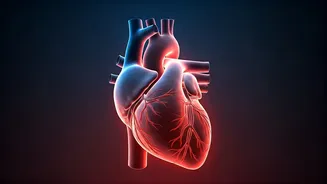Embrace Regular Exercise
Consistent physical activity is pivotal for promoting healthy blood circulation. Engaging in activities like brisk walking, jogging, swimming, or cycling
regularly stimulates blood flow throughout the body. Exercise encourages the blood vessels to function efficiently and helps prevent the buildup of plaque in arteries. Aim for at least 150 minutes of moderate-intensity exercise or 75 minutes of vigorous-intensity exercise each week. Incorporate a mix of cardio and strength training exercises for maximum benefit. Staying active supports the health of your heart and blood vessels, and helps to reduce the risk of cardiovascular diseases.
Maintain a Healthy Diet
A diet rich in nutrients plays a critical role in supporting good circulation. Prioritize foods like fruits, vegetables, whole grains, and lean proteins, which are all rich in vitamins, minerals, and antioxidants. These nutrients help to protect the blood vessels from damage and improve blood flow. Limit your intake of saturated and trans fats, sodium, and added sugars, as these can contribute to the formation of plaque and reduce blood flow. Include foods rich in omega-3 fatty acids, like salmon and flaxseeds, which have been shown to improve blood vessel health. A balanced diet is a key foundation for optimal vascular health.
Stay Hydrated, Always
Adequate hydration is often overlooked, but it is fundamental for healthy blood circulation. Water is essential for maintaining blood volume and ensuring that blood flows smoothly throughout the body. Dehydration can lead to increased blood viscosity, making it harder for the heart to pump blood effectively. Aim to drink an adequate amount of water throughout the day, depending on your activity level and the climate. Generally, it's recommended to drink at least eight glasses of water per day. Pay attention to your body's signals, and drink when you feel thirsty. Proper hydration supports efficient blood flow, maintaining energy levels and overall well-being.
Manage Your Stress
Chronic stress can negatively affect blood circulation and cardiovascular health. High levels of stress can cause blood vessels to constrict, elevating blood pressure and potentially hindering blood flow. Find healthy ways to manage and reduce stress through practices such as yoga, meditation, deep breathing exercises, or spending time in nature. Make sure to get enough sleep, as sleep deprivation can increase stress levels. Engaging in relaxing activities, and pursuing hobbies you enjoy can also help manage stress. Regularly addressing and managing stress is vital for promoting healthy blood flow and overall cardiovascular well-being.
Quit Smoking, Limit Alcohol
Both smoking and excessive alcohol consumption negatively impact blood circulation. Smoking damages blood vessels and reduces the amount of oxygen that reaches the tissues. If you are a smoker, quitting is one of the best steps you can take to improve your vascular health. Excessive alcohol intake can also harm blood vessels and increase blood pressure. Moderate alcohol consumption, if any, is recommended. Limiting or avoiding these habits will dramatically improve your circulation, reduce your risk of cardiovascular problems, and improve your overall health.






















